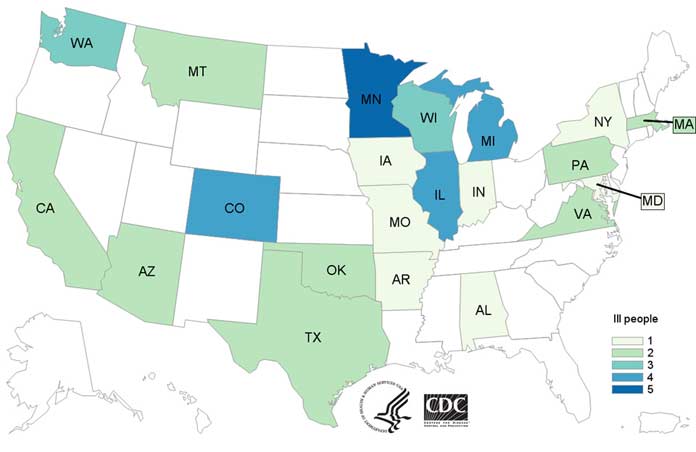Our law firm is investigating the E. coli O121 and E. coli O26 outbreaks linked to General Mills flour. At least 46 people from 21 states have been sickened. We continue to get contacts from people who were diagnosed with E. coli but are not sure if they are part of these outbreaks, so it is possible these numbers will grow.
The CDC has announced that these outbreaks of Shiga toxin-producing E. coli (STEC) infections have grown to include four more people since its last update. Of the 46 sickened, 13 have been hospitalized, one with a complication called hemolytic uremic syndrome (HUS), which causes kidney failure and a host of other severe medical problems.
Outbreak Investigation
People who were sickened in these E. coli O121 and O26 outbreaks had onset of illness (first symptoms) ranging from December 21, 2015 to June 25, 2016. Ill people range in age from 1 year to 95, with a median age of 18. The most recent illness started on June 25, 2016–6 months of people getting sick from flour.
Illnesses that occurred after June 29, 2016, might not yet be reported due to the time it takes between when a person becomes ill and when the illness is reported to CDC. So, as stated above, the outbreak count may grow.
To date, the case count by state is as follows: Alabama (1), Arkansas (1), Arizona (2), California (2), Colorado (4), Iowa (1), Illinois (4), Indiana (1), Massachusetts (2), Maryland (1), Michigan (4), Minnesota (5), Missouri (1), Montana (2), New York (1), Oklahoma (2), Pennsylvania (2), Texas (2), Virginia (2), Washington (3), and Wisconsin (3).
E. coli O121 Found in General Mills Flour
- In June 2016, laboratory testing by the FDA found E. coli (STEC) O121 in samples of General Mills flour collected from the home of an ill person in Oklahoma. “The STEC O121 isolated from the flour sample has the same PFGE pattern, or DNA fingerprint, as the outbreak strain” (CDC).
- Also in June 2016, the FDA found STEC O121 in an open sample of General Mills flour collected from the homes of ill people in Colorado and Arizona. Whole genome sequencing (WGS) showed that the “isolates from the flour samples were closely related genetically to the STEC O121 isolates from ill people” (CDC).
E. coli O26 Found in General Mills Flour
“In July 2016, laboratory testing by General Mills and FDA isolated STEC O26 from a sample of General Mills flour. Whole genome sequencing (WGS) showed that the STEC O26 isolated from the flour sample was closely related genetically to isolates from an ill person. The flour tested was not included in the earlier General Mills recalls” (CDC).
After this finding, General Mills expanded its flour recall. Here is a list of all recalled flour. The recall includes Gold Medal and Signature Kitchens brands.
Lawsuit against General Mills for E. coli from Gold Medal or Signature Kitchens Flour
You may have the right to sue General Mills for compensation. Contact our law firm for a free consultation with an E. coli lawyer if any of the following apply:
- You have been told you are part of either the E. coli (STEC) O121 or O26 outbreak;
- You have been diagnosed with STEC O121 or O26 and are unsure if you are part of one of these outbreaks.
In 2009, people were sickened by contaminated cookie dough. At that time, we let readers know that E. coli victims should not be blamed for an outbreak.
